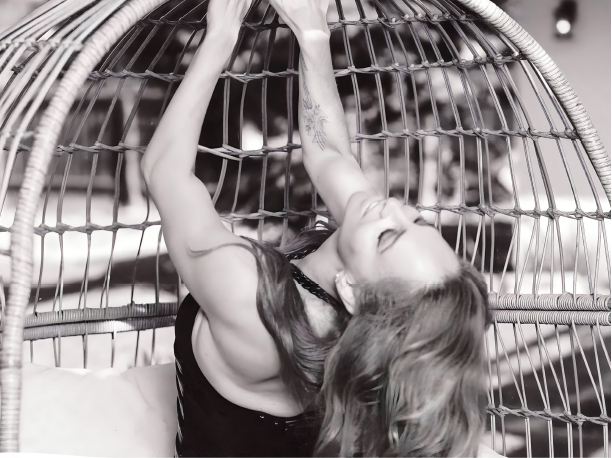DR. SAMANTHA HARTE
Breaking The Boundaries

In the world of physical therapy, Dr. Samantha Harte is a name synonymous with innovation, expertise—and compassion. With a career spanning two decades, she has left an indelible mark on the field, revolutionizing how we approach rehabilitation. Beyond her clinical practice, Dr. Harte is also an accomplished author whose groundbreaking book Breaking the Circuit: How To Rewire Your Mind for Hope, Resilience and Joy in the Face of Trauma is garnering acclaim for its insightful impact on the lives of countless individuals.
This former addict knows what she says. Dr. Harte has come to realize that, whether we’re addicted or not, we all suffer from some degree of soul sickness. We navigate love and loss throughout our lives with little or no guidance, often fumbling our way through with self-sabotaging behaviors. Despite her initial resistance to the well-known Twelve Steps of Alcoholics Anonymous, Dr. Harte eventually reimagined them so that they worked in her own life. In the process, she discovered that the spiritual concepts in each step have universal application and can help people learn new ways of navigating adversity—not just addiction.
A DEEP-ROOTED PASSION
Dr. Harte’s journey into physical therapy began with a deep-rooted passion for helping others overcome physical challenges and reclaim their independence. Through innovative interventions, she has helped patients overcome the limitations of injury and harness the brain’s innate capacity for healing and regeneration through her Strong Harte Fitness, where she tailors physical therapy programs for individual client-patients to strengthen bodies to regain flexibility and mobility.
Now fourteen years sober, she continues to bridge the gap between mind-body wellness and believes that challenging work starts on the inside and radiates outward. She wants her clients to turn their physical and spiritual pain into power so they can live a life full of joy.
Dr. Harte is a living embodiment of her personal and professional experience. She often calls vulnerability her superpower and sees her soul work as the necessary bridge between the life she had and the life she has created. She continues her practice in the fitness industry, breaking boundaries and forging new paths toward healing and wholeness.
Here is the rest of her story…

You never realized your mother was living in a loveless marriage. In fact, you’ve said, “She juggled lies to feel alive.” How did this affect you when you found the truth?
When I initially found out about her extra-marital affairs, I believed in my bones that she was justified. She had painted a picture of my father as a terrible husband, but great father. Since he spent most of his time in the basement, my mother’s word ruled. What she said, how she felt, and the decisions she made were backed by the self-righteous anger that, as a child, I stood behind. As I got older, though, I saw her oversharing as reckless to my younger self, blurring the lines between parent and friend, truth and lies. This would later set the tone for all kinds of self-justified behaviors that were harmful not only to myself, but to the people around me.
Do you believe this sparked your angst, resulting in your destructive behavior?
Once I left home and set off to Boston University, I wrestled with a ton of anger and confusion about my childhood. I wondered why my father was so emotionally absent and I questioned why my mother painted such a dark picture to her young girls, which of course was not our burden to bare. It’s impossible to know what kicked off my addiction, but here’s what I can say: Though it runs in my family, there has never been a single study that links a cause-and-effect relationship to genetics and active addiction. What science has uncovered, however, is the deep link to a culmination of trauma, small and big, to active addiction. So, was my mother’s lack of boundaries the cause of my addiction? No. But did it contribute to a lack of safety and a practice of self-abandonment as a child that played out into my adulthood? Oh yes.
What were your biggest challenges during your recovery process, and how did you navigate them?
Early recovery was extremely difficult. Remember, addicts are not just dealing with weaning off physical dependency, but for the first time (possibly in their lives), coming up against the emotional turmoil and heartache that fueled the addiction in the first place. Every person who clinked their margarita glass pissed me off. Every small feeling felt like it would swallow me whole. The most excruciating part of early recovery was the voice inside my head. She was loud, cruel and unrelenting. I let her rule my life for several years before I had the kind of surrender required to make real change. Until then, I just hung on for dear life and borrowed other people’s hope whenever I could.
Do you ever think your old behaviors will ever re-emerge?
My old behaviors re-emerge all the time! Not in the form of a physical relapse, but in the form of an emotional one. People-pleasing, perfectionism, and numbing: Those behaviors are so deeply ingrained because they were the tools that kept me safe in childhood and are now harmful in adulthood. When I feel afraid, my default is to control the world around me, especially the people, places, and perceptions. In this state I feel anxious and obsessive about “figuring it out.” The beauty of time in recovery is that the threshold for this emotional state becomes less and less tolerable—and lord knows, I didn’t get sober to be miserable. So, when the old behaviors show up, I self-regulate, self-examine, and pivot.


Although your book addresses tragedies and traumas, the book is more about your triumph.
For a couple of months in early recovery, I continued to smoke marijuana. Eventually, I whispered to my sponsor that if everyone says sobriety means nothing mind altering from the neck up, then it must mean weed too. I started my day count over and ever since February 28th, 2009, I have not put a single drink or drug in my body. However, I must differentiate physical and emotional sobriety. Once addicts get physically sober, their work has just begun. Now, all the pain they have been anesthetizing is right at the top of their throat, and without new coping skills and a lifetime of practicing new behaviors, all bets for a new life are off. It took five years of physical sobriety, holding on for dear life to control at all costs, before I hit emotional rock bottom and finally reimagined the 12 steps to change my life for the better.
In what ways do you advocate for addiction awareness and support others who are struggling with similar challenges?
Every day I speak openly and honestly about addiction and living sober. I help addicts and non-addicts both in my personal and professional life navigate pain, cope with uncertainty, and seek out joy. I speak at recovery meetings and corporations about mind-body wellness being an inside job. I also host a podcast called The Truth About Addiction to dispel the stigmas and myths associated with this condition and educate others on a modern take of the 12 steps as a blueprint for living. My book is my greatest project to date, which tells my personal story from heartbreak to hope, and how anyone- addict or not- can use the 12 steps to turn their pain into power.
How do you maintain your sobriety and prioritize your mental and physical well-being in your daily life?
I work on my spiritual fitness every 24 hours. Knowing that life is in session and things get hard, I make sure to plug in soul care. That can look like any number of things: yoga, time in nature, belly laugher, dance, self-reflection and authentic conversation. I seek joy like the air I breathe. I seek stillness so I can tap into my intuition. I love movement and always have, which releases natural feel-good chemicals and puts me in my body and out of my head. I take my physical and mental wellness very seriously, and I literally plug myself into my own calendar the way I plug in my annual physical. Nourishing my body and spirit are non-negotiable. It’s not a habit, it’s a lifestyle.
What advice would you give to those who are supporting addicts through their recovery journey?
To those struggling: You are not bad. You are a good person who made bad choices. You found a solution to your problem, which was unmanageable pain, and it’s completely understandable. But now that solution has become a problem in and of itself, so you’ve got to hang on long enough to do the inner work and heal. It’s not going to be easy, but you are worth it. Read my book and work the steps. They can be a guidepost for how to get through life, no matter how hard it gets. I was a diehard cocaine addict who now has 15 years sober and a big, beautiful life. If I can do it, so can you.
To those supporting them: Hard as it is, you cannot fix or save the addict (believe me, I’ve tried.) The best thing you can do is focus on your own healing. You, too, have a broken heart that needs your attention. Work the steps. Find out who you are when you are not the caretaker. Do what makes you laugh. Uncover your pain. Discover what brings you comfort in the uncertainty that is life. Eventually, with practice, you will come to know peace whether the addict is using or not.
For more information on Dr. Samantha Harte, visit drsamanthaharte.com





